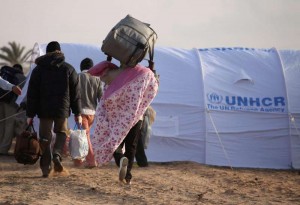
Egypt was organizing about 30 of the flights. France, Italy and the United Kingdom were all contributing to the airlift, while UNHCR and the IOM are both chartering flights. The Tunisian government had said on Wednesday that some 25,000 people at the border were in urgent need of onward transport.
UN High Commissioner António Guterres, describing the evacuation as a “logistics nightmare,” told the British Broadcasting Corporation on Thursday. “Rich countries have brought home their nationals. Now it is time to help people from poor nations to return home.”
Since anti-government protests in Libya descended into violence in mid-February, more than 90,000 people are believed to have fled from western Libya into Tunisia and some 80,000 to Egypt. In the 24 hours up to 8am on Thursday, an estimated 9,000 people crossed into Tunisia.
UNHCR staff at the border said the inflow was continuing on Thursday, but at a greatly reduced rate. It is not clear whether people were being prevented from leaving Libya.
Most of the arrivals have been from Egypt in a country where some 1.5 million migrant workers were employed before the violent split in Libya. Although about three-quarters of the Egyptians have been repatriated, some 12,000 Egyptians remain in Tunisia. UNHCR staff have seen people from more than 20 other countries at the border, including more than 5,300 Bangladeshis who have crossed in the past 24 hours. .
Guterres on Thursday reiterated his concern for people of concern to UNHCR inside Libya. More than 8,000 refugees and 3,000 asylum-seekers are registered with UNHCR in Libya, but the real figure is believed to be higher.
The High Commissioner said UNHCR was talking to resettlement countries to try to find solutions for the refugees in Libya as well as those who had managed to flee the country, including civilians from Somalia and Eritrea. People from sub-Saharan Africa have been arrested in Libya because of rumours that they could be mercenaries.
Meanwhile, UNHCR continues to move tents and other relief items to the border, where a tented camp has sprung up at a new transit centre established by the Tunisian authorities. At least 10,000 people stayed in the camp on Wednesday night. “We hope to double this capacity in the coming couple of days,” said UNHCR spokesperson Sybella Wilkes in Geneva.
On the other side of Libya, people have also been crossing to Egypt since the crisis erupted, but the scenes at the Libya-Egypt border are far more orderly. About 6,000 people crossed into Egypt at the Sallum border post on Wednesday, according to UNHCR staff.
They included a large convoy of Egyptians who came from western Libya. UNHCR, with help from the military, distributed 400 food packages to people stranded at the border. UNHCR staff have heard several accounts from Tunisians and Egyptians that they feared being targetted in Libya.
UNHCR is expected to launch a supplementary appeal later this week for US$18 million to fund its emergency response programme for Libya.
UNHCR
